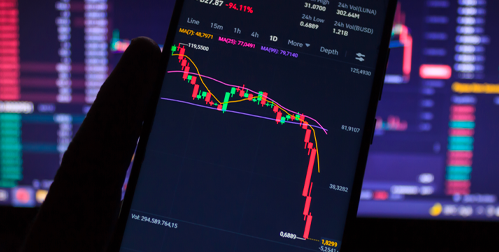Incoming Economic Reports Scare Investors
No news is good news. Unfortunately for the market, there is a lot of upcoming news this week. And it may not look good at all. US stocks fell as investors reacted to the jobs report. They also dropped in anticipation of fresh data on inflation and corporate earnings. This information could influence the Federal Reserve’s decision to raise interest rates even more aggressively.
Stock prices heated up last week until the jobs report threw cold water on them. The labor market is still strong. This may be good for workers but not for stocks. The market is already pricing in a 75-basis-point raise in July. Traders are worried. The Fed may see a strong labor market as a sign that higher interest rate hikes are needed. Investors fear that over aggressive hikes will push the economy into recession.
Inflation data is set to be released on Wednesday. Investors are nervous about its implications. Consumer prices hit a four decade high in May. The Dow Jones estimates the consumer price index will show inflation rising above May’s 8.6% level to 8.8%. The data indicates the fastest pace of inflation since December 1981. Charlie Ripley, senior investment strategist for Allianz Investment said, “It doesn’t appear like we’re going to have a decline in inflation any time soon.”1
Investors aren’t the only ones anxious about inflation. The New York Fed released the Survey of Consumer Expectations. It shows the one-year outlook for inflation rose in June to its highest level in a decade. The survey showed people believed inflation may someday decrease. But it will remain far above the Fed’s 2% long-run inflation goal.2
Individual and Corporate Earnings on the Decline
Workers are right to be worried about inflation. Real average hourly earnings decreased in May from the previous month. Inflation is erasing any gains in wages according to the Labor Department. Economic expert Edward Yardeni said, “We’ve seen substantial increases in wages, that’s the good news. The bad news is when Americans go shopping, they find that their purchasing power is basically zip. It’s been unchanged for the past year because prices have gone up so much.”3
The Survey of Consumer Expectations also showed a negative outlook on housing and employment. Those surveyed expected home prices to fall almost 5% next year. That is the lowest survey reading since February 2021. When it comes to employment, 40% believe that unemployment will be higher next year. People also believe they have a greater chance of losing their job over the next year.
Major financial firms and household name companies are set to post earnings this week. Investors are not looking forward to what they may learn. Corporate earnings can indicate how badly higher prices and weaker consumer sentiment hurt profits. Traders fear another round of heavy selloffs if earning expectations are not met.4
Meanwhile, bond markets continue to flash a key recession warning sign. The US yield curve remains inverted. Short term bond yields are higher than longer-dated ones. This signals bond investors are not hopeful about the economy’s long term prognosis.
Greg Bassuk, chief executive officer at AXS Investments said, “Investors should brace for continued volatility in July, with ongoing uncertainties looming with respect to inflation, Fed policy, recession concerns, the enduring Russia-Ukraine war, all as we also move into corporate earnings season.”5 You can brace for volatility. You need to find a stable haven for your assets. The Gold IRA from American Hartford Gold can protect your wealth from uncertainty. Contact us to learn more about it today.






